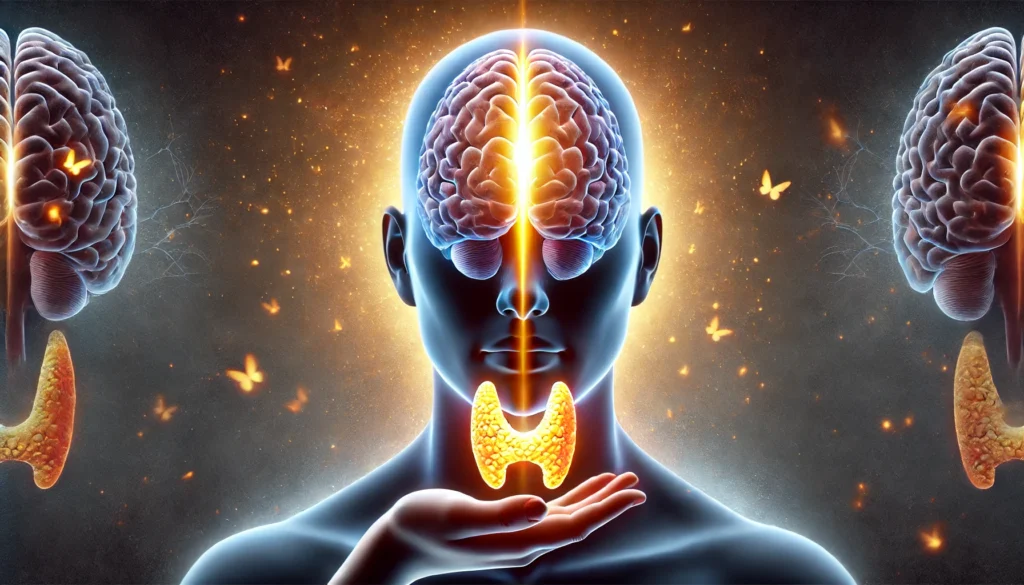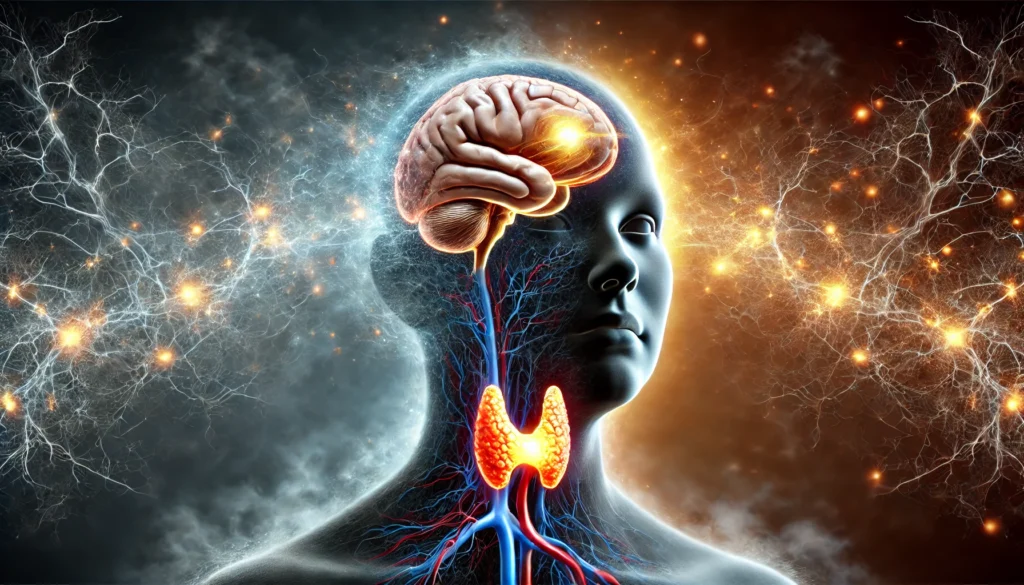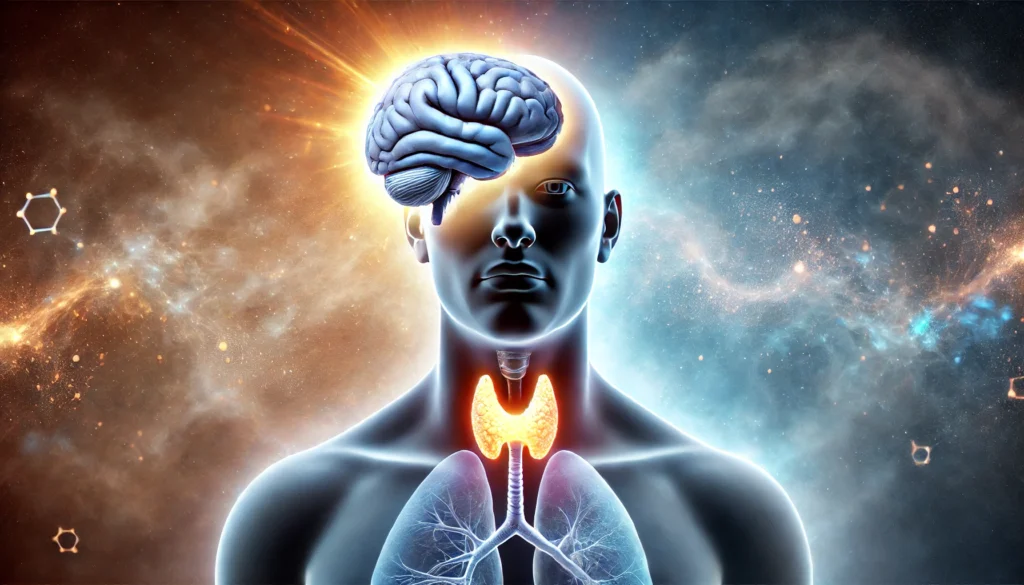Graves’ disease is an autoimmune disorder characterized by hyperthyroidism, where the thyroid gland overproduces hormones. This excess in hormones can lead to symptoms such as anxiety, tremors, and weight loss. Graves’ disease is the most common cause of hyperthyroidism and has significant implications for overall health.
You may also like: Understanding the Science Behind Lost Memory
The Thyroid’s Role in the Body
The thyroid gland, located in the neck, plays a pivotal role in regulating metabolism, energy production, and even mental health. The hormones it secretes, primarily thyroxine (T4) and triiodothyronine (T3), influence nearly every cell in the body. An imbalance in these hormones, as seen in Graves’ disease, can disrupt numerous bodily functions.
Metabolic Regulation
Thyroid hormones are central to controlling the body’s metabolism, influencing how efficiently cells convert nutrients into energy. An overactive thyroid, as seen in Graves’ disease, accelerates metabolism, leading to symptoms like rapid weight loss and increased heart rate. Conversely, an underactive thyroid slows metabolic processes, often resulting in weight gain and fatigue.
Energy Production
Energy production in the body is closely linked with thyroid hormone levels. Adequate hormone levels ensure that cells perform optimally, sustaining physical and mental activities. In Graves’ disease, excessive hormones can lead to an energy imbalance, causing restlessness and difficulty in maintaining focus.
Mental Health Implications
The impact of thyroid hormones extends to mental health, affecting mood and cognitive function. Imbalances can lead to mood swings, anxiety, and depression. Understanding these effects is crucial for addressing mental health concerns associated with thyroid disorders.
Autoimmunity and Thyroid Function
Graves’ disease is an autoimmune condition, meaning the body’s immune system mistakenly attacks healthy thyroid cells. This immune response triggers the overproduction of thyroid hormones, disrupting normal bodily functions. The autoimmune nature of Graves’ disease adds complexity to its management and treatment.
The Connection Between Thyroid Dysfunction and Cognitive Decline
The relationship between thyroid disorders and cognitive function is complex and multifaceted. Research suggests that both hyperthyroidism and hypothyroidism can affect brain function, potentially leading to cognitive decline.
Can Graves’ Disease Cause Dementia?
While the direct link between Graves’ disease and dementia is still being explored, studies have indicated that thyroid dysfunctions can exacerbate cognitive impairment. Hyperthyroidism, as seen in Graves’ disease, can lead to symptoms such as memory loss and difficulty concentrating, often mistaken for dementia.
Cognitive Symptoms of Hyperthyroidism
Individuals with Graves’ disease may experience cognitive symptoms that mimic those of dementia, such as forgetfulness and confusion. These symptoms can be distressing, affecting daily life and interpersonal relationships. Understanding the underlying thyroid-related causes is essential for appropriate management.
Research Insights on Dementia Risk
Emerging research suggests a potential risk of dementia in individuals with untreated or poorly managed Graves’ disease. The chronic elevation of thyroid hormones might have long-term effects on brain health, emphasizing the importance of early intervention. Continued studies are critical to clarifying this connection and informing treatment strategies.
Differentiating Dementia from Thyroid-Induced Cognitive Impairment
Differentiating between dementia and cognitive impairment due to thyroid dysfunction requires careful evaluation. Medical professionals must consider thyroid function tests and neuropsychological assessments to accurately diagnose and treat affected individuals. This distinction is crucial for tailoring effective treatment plans.
Hypothyroidism and Dementia
Interestingly, the inverse condition, hypothyroidism, characterized by low thyroid hormone levels, has also been associated with cognitive decline and dementia. Symptoms of hypothyroidism, such as fatigue and memory problems, overlap with those of dementia, complicating diagnosis and treatment.
Symptoms and Overlaps
Hypothyroidism presents with symptoms that can easily be confused with dementia, including sluggishness, depression, and impaired memory. These overlaps necessitate a thorough examination of thyroid function in individuals presenting with cognitive complaints to ensure accurate diagnosis.
The Role of Thyroid Hormone Replacement
Thyroid hormone replacement therapy is commonly used to treat hypothyroidism, potentially alleviating cognitive symptoms. However, the response to treatment can vary, highlighting the need for personalized approaches. Ongoing monitoring and adjustment of therapy are often required to achieve optimal outcomes.

Long-term Cognitive Effects
Long-term cognitive effects of hypothyroidism remain a subject of study, with some evidence suggesting potential reversibility of cognitive decline with appropriate treatment. Further research is needed to fully understand these dynamics and improve management strategies.
Exploring the Mechanisms: How Thyroid Dysfunction Affects the Brain
The thyroid-brain connection is primarily mediated through metabolic pathways. Thyroid hormones play a crucial role in the development and function of the central nervous system. They influence neurogenesis, myelination, and synaptic function, all critical for maintaining cognitive health.
Metabolic Pathways and Brain Function
Thyroid hormones regulate key metabolic processes in the brain, impacting energy availability and neuronal activity. Disruptions in these pathways can lead to altered brain function and cognitive decline. Understanding these mechanisms is vital for developing targeted interventions.
Neurogenesis and Brain Health
Neurogenesis, the process of generating new neurons, is influenced by thyroid hormone levels. Adequate hormone levels support brain plasticity and cognitive resilience. In thyroid dysfunction, impaired neurogenesis may contribute to cognitive deficits, underscoring the importance of maintaining hormonal balance.
Myelination and Neural Transmission
Myelination, the formation of protective sheaths around neurons, is essential for efficient neural transmission. Thyroid hormones play a role in myelination, and imbalances can lead to disrupted communication between brain cells. This disruption may manifest as cognitive and memory impairments.
Synaptic Function and Cognitive Processing
Synaptic function, crucial for cognitive processing, is affected by thyroid hormone levels. Hormonal imbalances can alter synaptic plasticity, impacting learning and memory. Addressing thyroid dysfunction is important for preserving synaptic integrity and supporting cognitive health.
Levothyroxine and Cognitive Health
Levothyroxine, a common treatment for thyroid disorders, is often used to manage symptoms. However, its impact on cognitive health is a subject of ongoing research. Some studies suggest that appropriate levothyroxine therapy can help alleviate cognitive symptoms associated with thyroid disorders, while others call for more research to understand its long-term effects on brain health.
Efficacy of Levothyroxine Therapy
The efficacy of levothyroxine in improving cognitive health varies among individuals, influenced by factors such as dosage and duration of treatment. Understanding these nuances is critical for optimizing therapeutic outcomes and minimizing side effects.
Long-term Impact on Brain Health
The long-term impact of levothyroxine on brain health remains an area of active investigation. While some patients report cognitive improvements, others experience persistent symptoms. Continued research is essential to elucidate these effects and guide clinical practice.
Personalized Treatment Approaches
Personalized treatment approaches, considering individual variability in response to levothyroxine, are gaining traction. Tailoring therapy to each patient’s unique needs and monitoring progress can enhance treatment efficacy and support cognitive health.

Historical Context and Current Trends
The link between thyroid dysfunction and cognitive impairment is not new. Historical records suggest that thyroid disorders have been associated with mental health issues for centuries. However, it is only in recent decades that scientific advances have allowed us to explore these connections in detail.
Historical Perspectives on Thyroid Disorders
Historical accounts reveal that thyroid disorders have long been recognized for their impact on mental health. Ancient texts describe symptoms resembling modern descriptions of thyroid dysfunction, highlighting the enduring nature of this health concern.
Early Medical Understanding
Early medical understanding of thyroid disorders was limited, often attributing symptoms to other conditions. Advances in medical science over the centuries have significantly improved our knowledge, allowing for more accurate diagnosis and treatment.
Evolution of Treatment Strategies
The evolution of treatment strategies for thyroid disorders reflects advancements in medical research and technology. From early surgical interventions to modern hormone replacement therapies, these developments have enhanced patient outcomes and quality of life.
Cultural and Societal Influences
Cultural and societal influences have shaped perceptions and management of thyroid disorders throughout history. Understanding these influences provides valuable context for current approaches to thyroid health.
Current Research Directions
Today’s research is focused on understanding the molecular pathways connecting thyroid dysfunction to cognitive decline. Advances in neuroimaging and molecular biology are shedding light on how thyroid hormones influence brain structures and functions.
Innovations in Neuroimaging
Innovations in neuroimaging techniques, such as MRI and PET scans, are enhancing our ability to visualize brain changes associated with thyroid dysfunction. These tools are critical for identifying structural and functional alterations linked to cognitive decline.
Molecular Biology Insights
Molecular biology research is uncovering the intricate mechanisms by which thyroid hormones affect brain cells. These insights are paving the way for new therapeutic targets and interventions aimed at preserving cognitive function.
Translational Research Efforts
Translational research efforts are bridging the gap between laboratory findings and clinical practice, ensuring that scientific discoveries inform real-world treatment strategies. This approach is crucial for advancing our understanding of thyroid and cognitive health.
Practical Implications for Health and Wellness
For health and wellness coaches, science journalists, and biohackers, understanding the connection between Graves’ disease and dementia is crucial. It provides a framework for developing strategies to manage thyroid health and support cognitive function.
Managing Thyroid Health
Regular monitoring of thyroid function, through blood tests and clinical evaluations, is essential for those at risk of thyroid disorders. Early detection and appropriate management can help mitigate the risk of cognitive decline.
Importance of Routine Screening
Routine screening for thyroid function is vital for early detection and intervention, particularly in populations at higher risk for thyroid disorders. Proactive management can prevent complications and support overall health.
Lifestyle Modifications for Thyroid Health
Lifestyle modifications, including dietary changes and stress management, play a crucial role in supporting thyroid health. Incorporating these strategies can enhance treatment outcomes and improve quality of life for individuals with thyroid disorders.
Collaborative Care Approaches
Collaborative care approaches, involving healthcare providers, patients, and caregivers, ensure comprehensive management of thyroid health. This team-based approach facilitates communication and coordination of care, optimizing health outcomes.
Supporting Cognitive Health
In addition to managing thyroid health, lifestyle interventions such as a balanced diet, regular exercise, and cognitive training can support brain health. Nutritional support, including iodine and selenium supplementation, may also be beneficial for thyroid function.
Dietary Considerations for Brain Health
A balanced diet rich in essential nutrients supports cognitive function and overall well-being. Key nutrients, such as omega-3 fatty acids and antioxidants, play a role in maintaining brain health and mitigating cognitive decline.
Exercise and Cognitive Resilience
Regular physical activity is associated with improved cognitive resilience and reduced risk of cognitive decline. Exercise enhances blood flow to the brain, promotes neurogenesis, and supports mental health, making it a valuable component of cognitive health strategies.
Cognitive Training and Mental Stimulation
Cognitive training and mental stimulation activities, such as puzzles and memory exercises, can enhance cognitive function and delay the onset of cognitive decline. These interventions are particularly beneficial for individuals at risk of thyroid-related cognitive impairments.
Future Implications
As research continues to unravel the complexities of the thyroid-brain connection, new therapeutic strategies may emerge. Understanding these pathways could lead to innovative treatments not only for thyroid disorders but also for cognitive impairments associated with them.
The Role of Technology and Biohacking
The future of managing thyroid and cognitive health may also involve personalized medicine and biohacking techniques. By leveraging the latest advances in technology, individuals can optimize their health outcomes through targeted interventions.
Personalized Medicine Approaches
Personalized medicine approaches, utilizing genetic and biomarker information, are revolutionizing the management of thyroid and cognitive health. These approaches enable tailored interventions, maximizing efficacy and minimizing side effects.
Biohacking for Enhanced Health
Biohacking, a growing trend in health optimization, empowers individuals to take control of their well-being through self-experimentation and data-driven insights. Techniques such as tracking biomarkers and implementing lifestyle changes can support thyroid and cognitive health.
Technological Innovations in Health Monitoring
Technological innovations in health monitoring, including wearable devices and mobile apps, offer real-time insights into thyroid and cognitive health. These tools facilitate proactive management and personalized care, enhancing health outcomes.

Conclusion
The link between Graves’ disease and dementia underscores the importance of thyroid health in maintaining cognitive function. By understanding the mechanisms at play and staying informed about current research, individuals can take proactive steps to support both their thyroid and brain health. This knowledge not only empowers health professionals but also provides individuals with the tools to enhance their overall well-being.
In summary, while the connection between Graves’ disease and dementia is complex, it is a critical area of study with significant implications for health and wellness. By exploring this link, we can better understand the broader impact of thyroid health on cognitive function and develop strategies to support both.
Further Reading:
Thyroid problems linked to increased risk of dementia
Hyperthyroidism May Raise Individual Risk of Dementia
Do thyroid problems lead to decreased brain function or the onset of dementia?
Important Note: The information contained in this article is for general informational purposes only, and should not be construed as health or medical advice, nor is it intended to diagnose, prevent, treat, or cure any disease or health condition. Before embarking on any diet, fitness regimen, or program of nutritional supplementation, it is advisable to consult your healthcare professional in order to determine its safety and probable efficacy in terms of your individual state of health.
Regarding Nutritional Supplements Or Other Non-Prescription Health Products: If any nutritional supplements or other non-prescription health products are mentioned in the foregoing article, any claims or statements made about them have not been evaluated by the U.S. Food and Drug Administration, and such nutritional supplements or other health products are not intended to diagnose, treat, cure, or prevent any disease.


